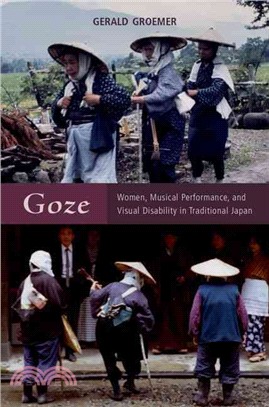Goze ─ Women, Musical Performance, and Visual Disability in Traditional Japan
商品資訊
ISBN13:9780190259044
出版社:Oxford Univ Pr
作者:Gerald Groemer
出版日:2016/04/21
裝訂/頁數:平裝/328頁
規格:22.9cm*15.2cm*1.9cm (高/寬/厚)
定價
:NT$ 1938 元優惠價
:90 折 1744 元
無庫存,下單後進貨(到貨天數約30-45天)
下單可得紅利積點:52 點
商品簡介
作者簡介
相關商品
商品簡介
In a tradition extending from the medieval era to the early twentieth century, visually disabled Japanese women known as goze toured the Japanese countryside as professional singers and contributed to the vitality of rural musical culture. The goze sang unique narratives (many requiring several hours to perform) as well as a huge repertory of popular ballads and short songs, typically accompanied by a three-stringed lute known as the shamisen. During the Edo period (1600-1868) goze formed guild-like occupational associations and created an iconic musical repertory. They were remarkably successful in fighting discrimination accorded to women, people with physical disabilities, the poor, and itinerants, using their specialized art to connect directly to the commoner public. The best documented goze lived in Echigo province in the Japanese northwest. Although their activities peaked in the nineteenth century, some women continued to tour until the middle of the twentieth. The last active goze survived until 2005.
In Goze: Blind Women and Musical Performance in Traditional Japan, author Gerald Groemer argues that goze activism was primarily a matter of the agency of performance itself. Groemer shows that the solidarity goze achieved with the rural public through narrative and music was based on the convergence of the goze's desire to achieve social autonomy and the wish of lower-class to mitigate the cultural deprivation to which they were otherwise so often subject. It was this correlation of emancipatory interests that allowed goze to flourish and attain a degree of social autonomy. Far from being pitied as helpless victims, goze were recognized as masterful artisans who had succeeded in transforming their disability into a powerful social tool and who could act as agents of widespread cultural development.
As the first full-length scholarly work on goze in English, this book is sure to prove an invaluable resource to scholars and students of Japanese culture, Japanese music, ethnomusicology, and disability studies worldwide.
In Goze: Blind Women and Musical Performance in Traditional Japan, author Gerald Groemer argues that goze activism was primarily a matter of the agency of performance itself. Groemer shows that the solidarity goze achieved with the rural public through narrative and music was based on the convergence of the goze's desire to achieve social autonomy and the wish of lower-class to mitigate the cultural deprivation to which they were otherwise so often subject. It was this correlation of emancipatory interests that allowed goze to flourish and attain a degree of social autonomy. Far from being pitied as helpless victims, goze were recognized as masterful artisans who had succeeded in transforming their disability into a powerful social tool and who could act as agents of widespread cultural development.
As the first full-length scholarly work on goze in English, this book is sure to prove an invaluable resource to scholars and students of Japanese culture, Japanese music, ethnomusicology, and disability studies worldwide.
作者簡介
Gerald Groemer began his studies of music as a pianist. After earning a Masters of Music and Doctorate of Musical Arts in piano performance at Peabody Conservatory, he entered the ethnomusicology program at Tokyo University of Fine Arts and Music where he earned a PhD in musicology in 1993, the first non-Japanese ever to do so. Since 1998 he has been professor of musicology, ethnomusicology, and Japanese music history at University of Yamanashi in K?fu Japan. He has authored several books on music and cultural history in both Japanese and English, including The Spirit of Tsugaru (2012), a translation Nishiyama Matsunosuke's writings on Edo Culture (1997), and Street Performers and Society in Urban Japan, 1600-1900: The Beggar's Gift (2015). He was awarded the prestigious Koizumi Fumio Prize for Ethnomusicology in 2008.
主題書展
更多
主題書展
更多書展今日66折
您曾經瀏覽過的商品
購物須知
外文書商品之書封,為出版社提供之樣本。實際出貨商品,以出版社所提供之現有版本為主。部份書籍,因出版社供應狀況特殊,匯率將依實際狀況做調整。
無庫存之商品,在您完成訂單程序之後,將以空運的方式為你下單調貨。為了縮短等待的時間,建議您將外文書與其他商品分開下單,以獲得最快的取貨速度,平均調貨時間為1~2個月。
為了保護您的權益,「三民網路書店」提供會員七日商品鑑賞期(收到商品為起始日)。
若要辦理退貨,請在商品鑑賞期內寄回,且商品必須是全新狀態與完整包裝(商品、附件、發票、隨貨贈品等)否則恕不接受退貨。
























